(1) DRAGON CON BANS AI ART FROM SALES AREAS. The Dragon Con 2024 Art Show Application Form includes this ban:
No AI artwork of any kind will be allowed to be sold or distributed in the Dragon Con Art Show, Comic and Pop Artist Alley, or Vendor Halls. Failure to comply with our AI Policy can lead to immediate removal from show floor.
(2) VOICE FOR HUGO CHANGE. Mary Robinette Kowal shared her knowledge of how Hugos are administered in a Bluesky thread that starts here. She contrasts how the disqualification of her audiobook novella “Lady Astronaut of Mars” was handled by the 2013 administrator versus the way those ruled “ineligible” have been treated by the 2023 administrator.
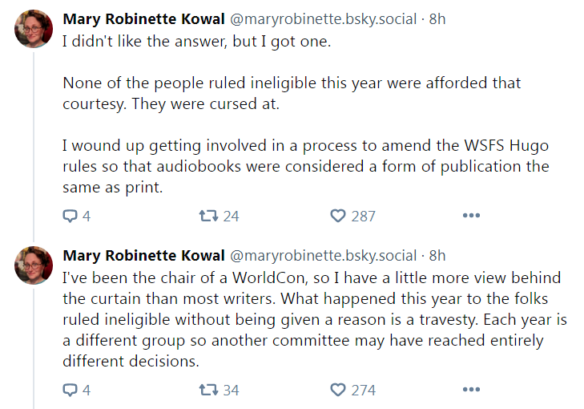
After providing more background history, Kowal makes a call for change in Hugo oversight.
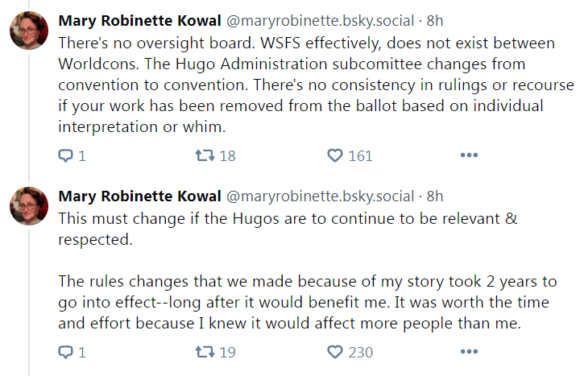
(3) CHENGDU WORLDCON ROUNDUP. [Item by Ersatz Culture.]
A couple of Chinese language videos about the Hugos
Whilst looking for coverage of the Hugos on the Chinese internet, I came across this Bilibili video, posted Wednesday 31st. It’s a compilation of 5 news items from a channel that I think I maybe submitted an item for last year. The final item – from around 10:20 in – is entitled
- 雨锅奖余波 (yuguo jiang yubo – Hugo Award Aftermath).
I don’t think there’s anything new there to anyone who’s been following File 770 coverage, but this is one of the few mainland China items I’ve seen on the subject, outside of user comments on various social media platforms, that – as previously covered – have had a tendency to disappear.
As I type this 3 or 4 days after the video was uploaded, it has received just over a quarter-of-a-million views. I’ve got a local backup copy just in case it does belatedly vanish.
The below screenshots and Google Translated renditions thereof are included primarily for the bullet comments from users. Filers might like to note that the video also includes a (machine translated?) screenshot of a Paul Weimer blog post.

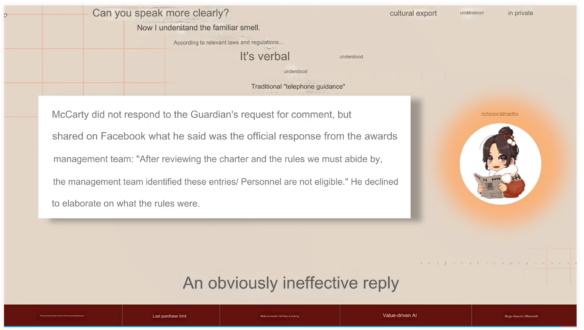

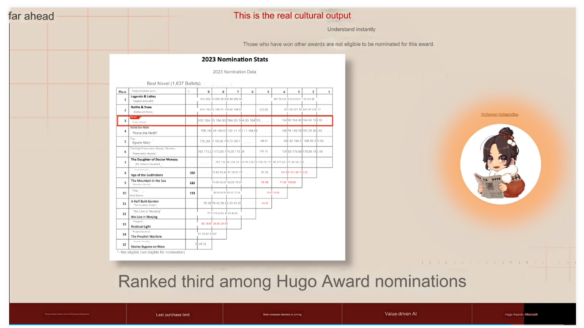
A day earlier, I came across this video from a YouTuber in Taiwan, which was posted 4 days ago, and has just over 200 thousand views as I type this. It’s another explainer for mainstream audiences, so again there won’t be much new to people who’ve been reading this site.
The video is edited in a snappy way, and very memey.
(The place where I came across a link to this video is also worthy of a write-up, but that will have to wait for another day.)

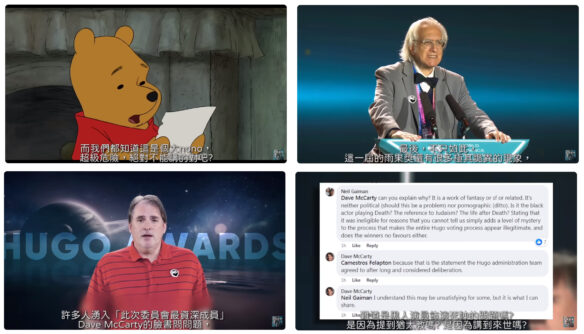
(4) SAWYER’S STATEMENT ABOUT TIANWEN PROJECT. Robert J. Sawyer, a Chengdu Worldcon guest of honor, responded to discussion about the Tianwen Project and his participation in a launch ceremony at the Worldcon in a Facebook comment this week.
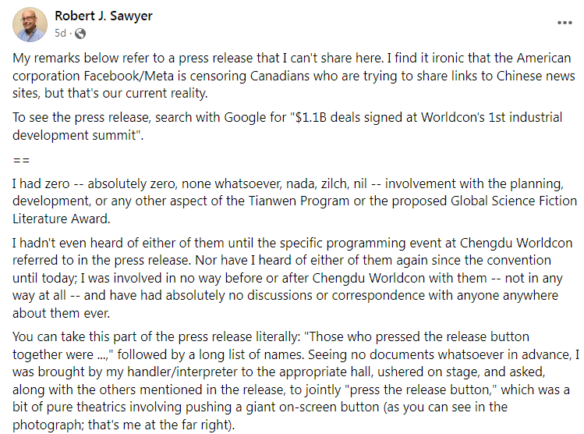
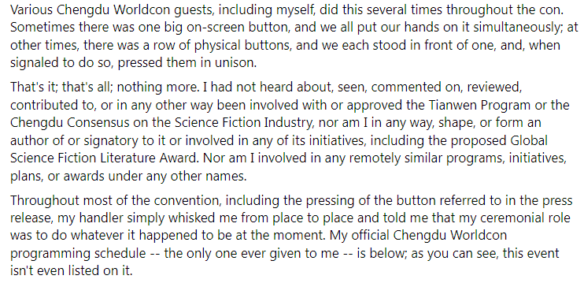
Elsewhere he answered some other questions about his guest of honor appearance.

And because people have been known to carelessly treat things others say in comments here as if they are my personal opinion (like Robert J. Sawyer, who recently blocked me in social media), I am going to quote what I wrote to a friend in October 2022 after passage at Chicon 8 of a resolution calling for Sergey Lukyanenko to be disinvited from the Chengdu Worldcon:
…Continuing a line of discussion I raised on FB — I want to be clear that I’m not demanding any action from Robert J Sawyer. If he volunteersto make a public statement, obviously I would run it. Otherwise, it’s not his fault that the other two GoHs are problematic. So while I expect at some point the Twitterati will try and railroad him because he’s the only English-speaker and the only GoH who answers his social media, I personally don’t think Sawyer has to take responsibility for the malfeasance of the committee or their refusal to clean up their GoH slate….
Which it seems to me is quite different from what some of his interrogators have had to say here and on FB. (And the malfeasance I had in mind in October 2022 was that the site selection voters who by then had been members for 10 months had yet to hear from the committee, people who wanted to buy new memberships complained that they couldn’t, and that the new Chengdu website had launched without any statement about who their Guests of Honor were, even though the names had been announced immediately after they won the bid.)
(5) NOT IF IT PUTS HIM OUT OF WORK. “Star Trek’s William Shatner Was Asked About His Stance On A.I. Replacing Him, And He Had An Interesting Response” reports Comicbook.com.
…Shatner recently spoke with Comicbook.com ahead of his upcoming appearance at Orlando’s MegaCon, and was asked about the possibility of his James T. Kirk one day being brought back to life, as it were, via A.I. Never one to shy away from hard questions, the actor gave his honest take on the situation, and how he’d respond to it depending on the situation:
“It’s an interesting question. The strike was all about getting permission to do that. And so if I’m alive, I don’t want A.I. to do that, but if I’m dead and they ask my family and they’re going to pay my family very well to sound like me, I would advise them to say yes.”
William Shatner isn’t so okay with allowing A.I. to take over his character or his own persona if he’s still alive, which is understandable. But if he’s no longer around to pass judgment, he’ll leave it to his family to decide. If a fair price is determined, apparently, he’s giving the green light to allow his likeness to be used for Captain Kirk.
(6) JENNELL JAQUAYS (1956-2024). Artist and game designer Jennell Jaquays, who created scenarios with myriad paths for Dungeons & Dragons, levels for video games like Quake II, and art that invited novices to try role-playing games, died January 10. The New York Times obituary is here.
… Over nearly five decades, Ms. Jaquays illustrated the covers and interiors of settings, modules, books and magazines for D&D and other role-playing games. In one of them, a red dragon roars while perched in front of a snow-capped mountain; in another, a nautiluslike spaceship floats above an alien world; in a third, two Ghostbusters prepare to tangle with a field of animated jack-o’-lanterns.
Ms. Jaquays also crafted scenarios of her own. Two of her earliest D&D modules, “Dark Tower” and “The Caverns of Thracia,” are renowned for their pathbreaking designs.
In the early days of D&D, many scenarios were fairly linear — enter dungeon, defeat monsters and plunder, assuming your characters survive.
Ms. Jaquays’s adventures were not so straightforward. They often contained several possible entrances and multiple avenues, some of them secret, by which players could accomplish their goals.
“The result is a fantastically complex and dynamic environment: You can literally run dozens of groups through this module and every one of them will have a fresh and unique experience,” the game designer Justin Alexander wrote about dungeons like Ms. Jaquays’s on his website in 2010…
(7) CHRISTOPHER PRIEST (1943-2024.) British sf writer Christopher Priest died February 2 at the age of 80. (Not to be confused with the comics author with the same name.) His novel The Prestige was a World Fantasy Award winner in 1996. His book The Islanders won the John W. Campbell Memorial Award and a British SF Association Award in 2012. Four other works also received BSFA Awards, Inverted World (1975), “Palely Loitering” (1980), The Extremes (1999), and The Separation (2003), the latter winning the Arthur C. Clarke Award as well. He was a Worldcon guest of honor in 1995, and received the Prix Utopia life achievement award in 2001.
In the late Eighties Priest also took time to pen The Last Deadloss Visions “an enquiry into the non-appearance of Harlan Ellison’s The Last Dangerous Visions”, which he called “a polemical pamphlet, written to express a point of view and to persuade others of that view.”
The British Council website’s “Christopher Priest – Literature” follows a long biography with a critical appreciation of his work. It says in part:
Christopher Priest was born in Cheadle, Greater Manchester, in 1943…. His first novel, Indoctrinaire, was published by Faber and Faber in 1970, beginning a stretch of two decades during which Priest’s novels appeared almost biennially. 1972’s Fugue for a Darkening Island saw Priest nominated for the John W. Campbell Award. His third novel, The Inverted World (1974), won Priest the first of his four BSFA (British Science Fiction Association) Awards. In the mid-1970s he was an associate editor of the UK semi-academic journal Foundations, which provided a distinctive platform for the criticism and popularization of science fiction at a time when the genre was not well established in the academy.
…Priest 1995’s epistolary novel The Prestige was a popular breakthrough. Winner of the World Fantasy Award and James Tait Black Memorial Prize, and nominated for the BSFA and Arthur C. Clarke awards, it was adapted into a film directed by Christopher Nolan, released to acclaim in 2006….
As time went by Priest generally was less interested in playing the role of elder statesman his accumulated honors had earned for him than he was in continuing to dish out the kind of fiery opinions he’d shared throughout his career. Consider that in 2012, before going on to win two major awards later in the year, he blasted the Arthur C. Clarke shortlist, saying he was dismayed that several quality books didn’t make the list, with sketches of the defects of the actual choices. (Although not all of the authors took it hard, judging from Charles Stross’ reaction, which was to issue a commemorative t-shirt.)
He is survived by his wife, Nina Allan, who followed her announcement of his passing with a chosen poem.
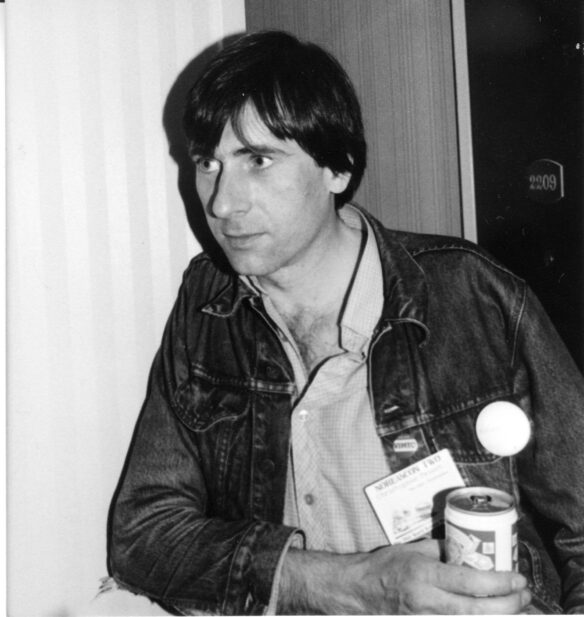
(8) TODAY’S BIRTHDAY.
[Written by Cat Eldridge.]
Born February 3, 1970 — Warwick Davis, 54. This is not by any means a complete listing of everything he’s done. Just remember that before lodging the complaint that I forgot to include something. I didn’t forget. I just didn’t include it.
Warwick Davis is much loved for being the title character in Willow and really not loved for being Lubdan the Leprechaun in, errr, the Leprechaun film series. Look you really don’t need to see the latter even if you’re seriously drunk on cheap fake Irish beer on St. Patrick’s Day. They made him a lot on money but they’re really awful. Willow on the other hand is sublime. It brings a tear to my eye when I see it.
He was the physical aspect of Wicket W. Warrick in Return of the Jedi, Caravan of Courage: An Ewok Adventure, Ewoks: The Battle for Endor and Star Wars: The Rise of Skywalker though the character was voiced by Darryl Henriques.

He also played a lot of other Star Wars characters. The Phantom Menace saw him play Wald, Weazel, and Yoda in the walking shots, and a street trader on Tatooine; The Force Awakens a Wollivan (and no, I don’t recognize all of these characters); A Star Wars Story saw him being Weeteef Cyubee; then Star Wars: The Last Jedi got the sneeze-worthy character names of Wodibin / Kedpin Shoklop, the latter in a deleted scene. Think I’m done? No. Next is Solo: A Star Wars Story where he’s Weazel / DD-BD / W1-EG5 / WG-22 and finally there’s The Rise of Skywalker where he’s Wicket W. Warrick for the final time plus Wizzich Mozzer again. Whew!
He’s in all five of the Harry Potter films in one or more of three roles — Professor Filius Flitwick, Goblin Bank Teller and Griphook, the latter just as the voice of that character. I’ve only seen the first three films and yes, I’ve loved them deeply even though all I’ve read of the novels was the first hundred pages of the first which I found exquisitely, deeply boring. God, I found her a bad writer.
Now here’s one that I really didn’t expect. He was in The Hitchhiker’s Guide to the Galaxy as Marvin the Paranoid Android. (Love the voicing of that character in the BBC radio production!) Again he didn’t voiced the character as that was provided by Alan Rickman.
He shows up twice in Narnia productions, once as Nikabrik in The Chronicles of Narnia: Prince Caspian film, and on the television film Prince Caspian and The Voyage of the Dawn Treader as Reepicheep. Loved those novels.
Finally he voiced Sniff (Snufkin) in the English language track for the Finnish crown funded animated Moominvalley series. Really great books. The Estate just allowed the likeness of the characters to be commercially used less than a decade ago. Have you seen a Moomin plushie? Oh really cute! I want!
(9) AND GOOD-BYE TO YOU TOO, OLD RIGHTS-OF-MAN. Bill Coberly asks “Are We All Too Cynical for Star Trek?” in a piece for The Bulwark, a political Substack, about the changing portrayal of Starfleet across the decades.
…This is not to say that the ’90s shows never delved into the complexity and nuance of this ethos—indeed, playing at the edges of their internal morality was how they derived much of their interest. A number of Starfleet admirals throughout TNG are shown to be venal or corrupt. One of the greatest episodes of Deep Space Nine (1992–99), “In the Pale Moonlight,” is entirely about how, in times of crisis, moral compromise may be necessary, even for Starfleet. But such cases are treated as exceptional, unusual circumstances far beyond the norm; as a rule, Starfleet is good, and the best way to be a good servant of the true and just in the world of Star Trek is by being a good Starfleet officer. How does one be a good Starfleet officer? By doing one’s job, by being a professional, by following one’s duty.
THINGS ARE DIFFERENT IN modern Trek. By “modern Trek” I mean the five major TV shows that have aired since the franchise returned to the small screen in 2017: Discovery (2017–present), Picard (2020–23), Lower Decks (2020–present), Prodigy (2021–present), and Strange New Worlds (2022–present). Starfleet as an institution often plays a partially antagonistic role in each of these shows. By the time of Picard, the titular paragon has quit Starfleet in a huff because it no longer lives up to his principles, and in both seasons one and three it is revealed that Starfleet has been compromised by hostile alien agents and cannot be trusted. The first season of Discovery ends with Starfleet condoning genocide, only to be stopped by our heroic crew; Season 2’s villain was an out-of-control Starfleet AI that threatened all life in the galaxy; and Seasons 3 and 4 keep the crew in near-constant conflict with Starfleet and/or Federation brass. Lower Decks is centered on the adventures of a low-level officer who routinely defies Starfleet regulations to help nearby planets in ways that Starfleet would not condone. Even Strange New Worlds, the most archetypal of the modern shows, emphasizes how unjust some of Starfleet’s rules are: In the first episode of the second season, the crew is forced to steal the Starship Enterprise itself to rescue a comrade in defiance of Starfleet’s orders….
(10) SFF BOOKS ON SALE. [Item by BGrandrath.] Back with another Whatnot commercial. The other day someone posted asking about a good place to buy books this might be the answer… “Over 40 Science Fiction Books | Vintage Book Haul”.
BOB’S Books will be on my nomination list for Best Fancast this year.
(11) ROMANTASY. The Guardian discusses “A genre of swords and soulmates: the rise and rise of ‘romantasy’ novels”.
…It is unclear where the “romantasy” label originated: though Bloomsbury said it coined the term to “identify the genre [Sarah J. Maas] was spearheading”, the term was posted on Urban Dictionary as early as 2008. In any case, its usage has exploded in the last year on social media and in marketing copy for fantasy romance titles.
Romantasy authors are selling well in part because of their huge popularity on social media; Maas’ publisher, Bloomsbury, says that videos with hashtags connected to her books have more than 14bn views on TikTok alone. On “BookTok”, the corner of the platform dedicated to book-related content, fans share their rankings of book series, theories about what might happen in future novels, compilations of favourite quotes and outfits inspired by books.
Such novels are typically set in fantastical worlds, with fairies, dragons, magic, but also feature classic romance plotlines – enemies-to-lovers, soulmates, love triangles. “Romance readers have discovered that romantasy has all the tropes they adore, but set in a world they can escape to and get lost in,” explains Ajebowale Roberts, an editor at HarperCollins.
“The Bachelor meets The Hunger Games” is how Canadian author Nisha J Tuli describes one of her romantasy novels, Trial of the Sun Queen….
(12) BURNSIDE Q&A. [Item by Steven French.] John Burnside is an award-winning poet and author: “John Burnside: ‘My stoner friends were into The Hobbit, but Gormenghast was darker’” in the Guardian.
The book that changed me as a teenager
Mervyn Peake’s Gormenghast series. My stoner friends were into Tolkien’s The Hobbit, but that didn’t interest me. What Peake created was darker, more intricate, at once more sinister and more beautiful than anything else I had read up to that point. At the end, I was left with a powerful impression of the richness of language, of its magical power. As my father would say, “people like us” didn’t become writers, (or musicians, or artists) but Peake made me wonder if writing was maybe worth the risk of honourable failure.
(13) TOP 10 STREAMING SFF FOR JANUARY. JustWatch has shared its rankings of the Top 10 Sci-Fi streaming films and TV series for January 2024.
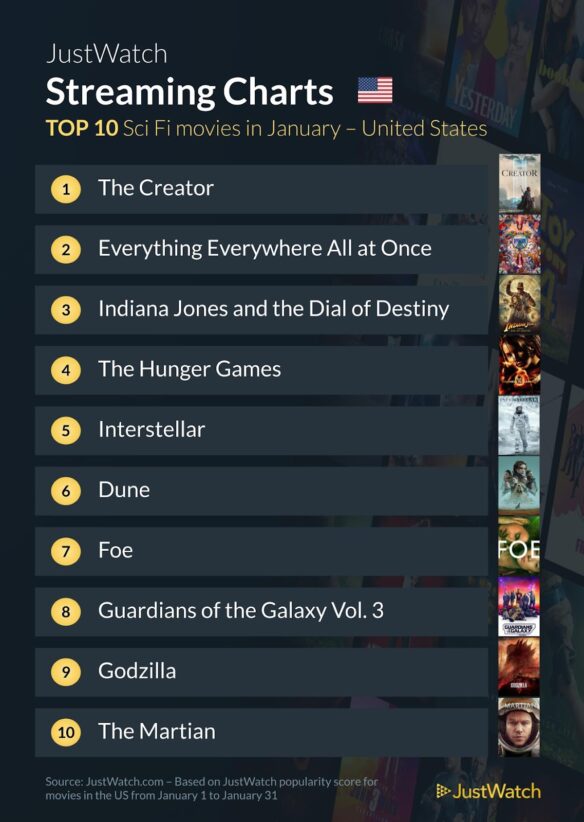
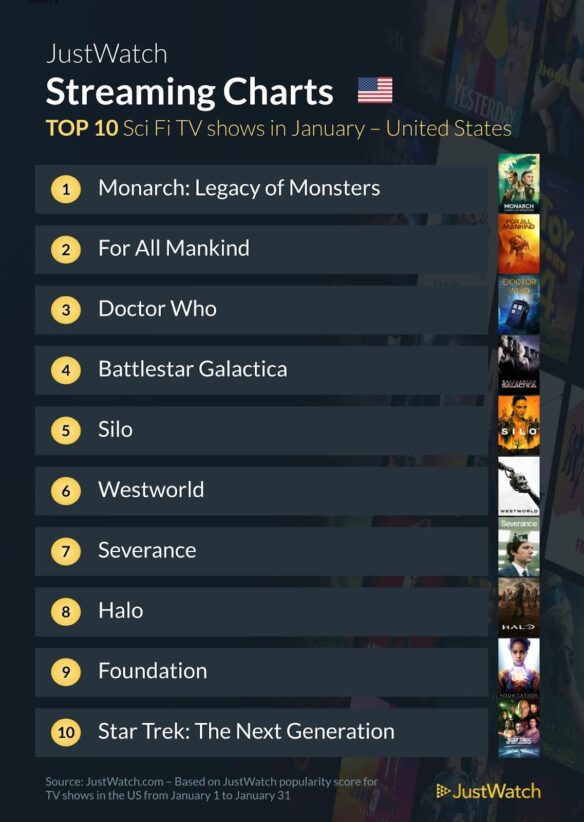
[Thanks to Cat Eldridge, SF Concatenation’s Jonathan Cowie, Ersatz Culture, BGrandrath, Ken Josenhans, Steven French, Mike Kennedy, Andrew Porter, John King Tarpinian, Chris Barkley for some of these stories. Title credit belongs to File 770 contributing editor of the day Maytree.]
